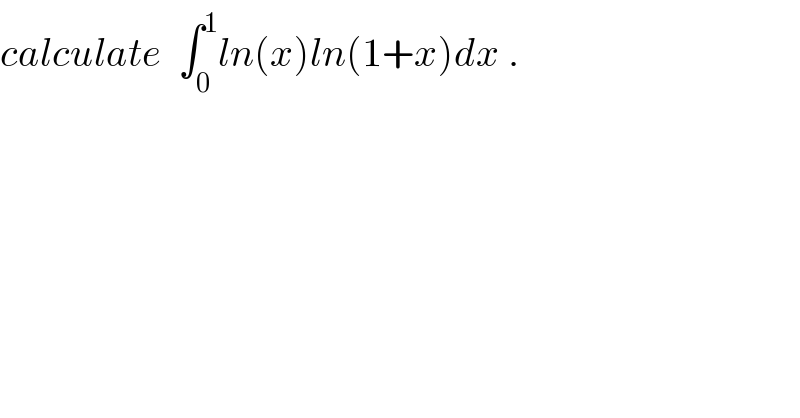
Question and Answers Forum
Question Number 45232 by maxmathsup by imad last updated on 10/Oct/18

Commented by maxmathsup by imad last updated on 11/Oct/18
![let I = ∫_0 ^1 ln(x)ln(1+x)dx we have for ∣x∣<1 ln^′ (1+x)=Σ_(n=0) ^∞ (−1)^n x^n ⇒ln(1+x)=Σ_(n=0) ^∞ (((−1)^n )/(n+1))x^(n+1) +λ x=0 ⇒λ=0 ⇒ln(1+x) =Σ_(n=1) ^∞ (((−1)^(n−1) )/n) x^n ⇒ I =Σ_(n=1) ^∞ (((−1)^(n−1) )/n) ∫_0 ^1 x^n ln(x)dx by parts A_n =∫_0 ^1 x^n ln(x)dx =[(1/(n+1))x^(n+1) ln(x)]_(x→0) ^1 −∫_0 ^1 (1/((n+1))) x^n dx =−(1/((n+1)^2 )) ⇒I =Σ_(n=1) ^∞ (((−1)^n )/(n(n+1)^2 )) let decompose F(x)=(1/(x(x+1)^2 )) F(x)=(a/x) +(b/(x+1)) +(c/((x+1)^2 )) a =lim_(x→0) xF(x)=1 c =lim_(x→−1) (x+1)^2 F(x)=−1 ⇒F(x)=(1/x) +(b/(x+1)) −(1/((x+1)^2 )) F(1) =(1/4) =1 +(b/2) −(1/4) ⇒1 =4+2b−1 =3+2b ⇒2b=−2 ⇒b=−1 ⇒ F(x) =(1/x) −(1/(x+1)) −(1/((x+1)^2 )) ⇒ I =Σ_(n=1) ^∞ (((−1)^n )/n) −Σ_(n=1) ^∞ (((−1)^n )/(n+1)) −Σ_(n=1) ^∞ (((−1)^n )/((n+1)^2 )) but Σ_(n=1) ^∞ (((−1)^n )/n) =−ln(2) Σ_(n=1) ^∞ (((−1)^n )/(n+1)) =Σ_(n=2) ^∞ (((−1)^(n−1) )/n) = ln(2)−1 Σ_(n=1) ^∞ (1/((n+1)^2 )) =Σ_(n=2) ^∞ (((−1)^n )/n^2 ) = Σ_(n=1) ^∞ (((−1)^n )/n^2 ) +1 let find Σ_(n=1) ^∞ (((−1)^n )/n^2 ) we have Σ_(n=1) ^∞ (((−1)^n )/n^2 ) =Σ_(n=1) ^∞ (1/((2n)^2 )) −Σ_(n=0) ^∞ (1/((2n+1)^2 )) =(1/4) (π^2 /6) −Σ_(n=0) ^∞ (1/((2n+1)^2 )) but Σ_(n=1) ^∞ (1/n^2 ) =(1/4) Σ_(n=1) ^∞ (1/n^2 ) +Σ_(n=0) ^∞ (1/((2n+1)^2 )) ⇒ Σ_(n=0) ^∞ (1/((2n+1)^2 )) =(3/4) Σ (1/n^2 ) =(3/4) (π^2 /6) =(π^2 /8) ⇒Σ_(n=1) ^∞ (((−1)^n )/n^2 ) =(π^2 /(24)) −(π^2 /8) =−(π^2 /(12)) ⇒ ∫_0 ^1 ln(x)ln(1+x)dx =−ln(2)−ln(2)+1 −(−(π^2 /(12))+1) =(π^2 /(12)) −2ln(2) .](Q45324.png)
Answered by tanmay.chaudhury50@gmail.com last updated on 11/Oct/18

Commented by tanmay.chaudhury50@gmail.com last updated on 11/Oct/18

